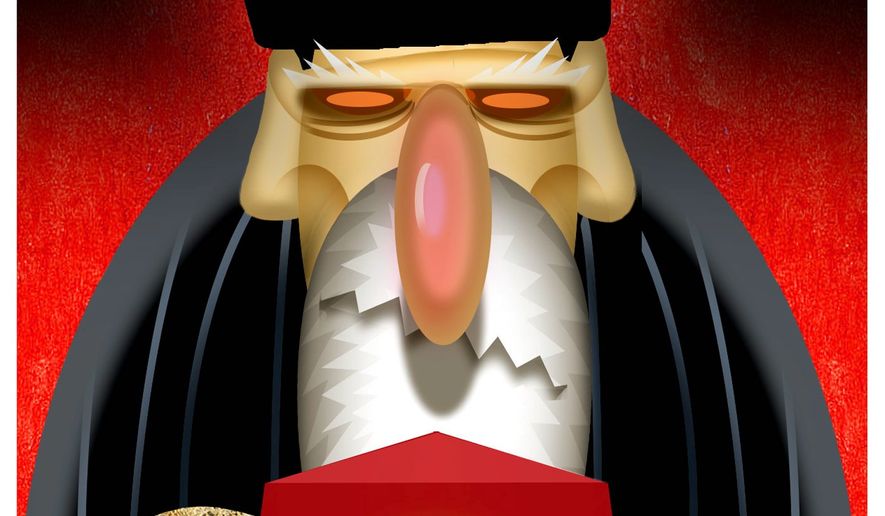OPINION:
In order to assist the creation of a Shia Crescent from the Persian Gulf to the Mediterranean Sea, the question remains: Is Iran working to thwart the creation of an independent Kurdistan? Are they working together with Syria in order to further this strategic goal? According to an Iraqi source, Iran is working to thwart the creation of an independent Kurdistan by trying to instigate a civil war among the Kurds by supporting groups opposed to Masoud Barzani. They are doing this because they perceive Kurdish autonomy in Northern Iraq to be a threat and they view the internal divisions among the Kurds to be the most effective way to destroy the dream of an independent Kurdistan for the Kurds presently are not united.
As Iranian journalist Mohsen Behzad Karimi related, “They will not tolerate at any cost an independent Kurdistan. An independent Kurdistan in Northern Iraq means joining Syrian Kurds and eventually after that, Turkish Kurdistan and Iranian Kurdistan will be annexed to that. Some Arab countries are using this issue to pressure Iran but in the long run, it is just a pressure tool. They are using Iranian Kurds, Iranian Arabs and Balochis to have leverage.”
Among the groups that Iran is using to pressure Mr. Barzani is the Gorran Movement and the PKK. “The Gorran Movement is primarily under the control of Iran,” Syrian Kurdish dissident Sherkoh Abbas proclaimed. “They were fighting against corruption and they are now taking all of their funding from Iraq and Iran. It is the same with the PKK, who is under the influence of Iran. They are fighting against an independent Kurdistan in Iraq. They are against a referendum for independence. This Iranian interference is intimidation so they don’t do a referendum and they won’t have access to sea.”
“The Iranian regime since the 1980s supported the Talabani faction,” Karimi stressed. “They helped lots of other Iranian-backed Kurds in Northern Iraq. There are still factions of Iraqi Kurds backed by Iran. If you check the ammunitions and light weapons, most of it comes from Iran. They deeply penetrated into Kurdistan. For example, the insurance companies are mainly in the hands of Iranian-backed companies, who are operating under the Iranian Revolutionary Guards.”
According to Mr. Abbas, the Iranians are afraid that with the assistance of President Trump, the Kurds will get access to the sea and this will disrupt their Shia Crescent. For this reason, he emphasized that Iran is working together with Turkey, Syria, Iraq and their proxy groups to thwart Kurdish independence. According to an Iraqi source, via PKK leader Raza Ultan, Iran threatened to attack Kurdish financial and economic resources. This threat was realized when the Iraqi government cut the KRG budget, thus creating an economic crisis for the Kurds. In addition, Iran has placed Hashdi Al Shahbi on Kurdistan’s borders, which the Iraqi source stressed poses an additional threat to the Kurdish authorities.
While Iran attempts to present to the West that their regional ambitions in Iraq and Syria are part of the struggle against ISIS, Israeli scholar Mordechai Kedar claimed that all parties that are involved in the Syrian Civil War and the chaos in Iraq are not so much interested in fighting against ISIS but rather in ensuring their position after the war: “They try to grab something in order to keep it together like vultures flying above the corpse of a cow. They are waiting for the cow to die in order to grab as much as they can. This is the situation. It is a multisided struggle that every party is involved in.”
In fact, Mr. Abbas has even claimed that Iran comprises ISIS: “Behind the scenes, Iran put their people in this organization. They did this to make the Syrian opposition appear like terrorists.” In other words, Mr. Abbas emphasizes that any assertions that Iran is useful for the struggle against ISIS is a non-starter for Iran at times cooperates with ISIS in order to further their agenda and regional ambitions. Furthermore, he stresses, “Iran, Iraq and Syria all agree that the Kurds should be oppressed. Kurdistan should be robbed of its territory. Despite their differences, they work together to prevent an independent Kurdistan.”
It should be noted that the Kurds have invested $5 million in order to save 3,001 Yazidis from the ISIS genocide. Numerous minorities in Iraq, whether they be Christian or Yazidi, have found that the only safe place for them to live is within Iraqi Kurdistan. An independent Kurdistan will thus help to preserve what is left of Iraq’s multicultural identity. It will also serve as a buffer against Iranian aggression in the Middle East region. And it is for these reasons that Iran via its proxies is fighting so hard in order to thwart an independent Kurdistan.
• Rachel Avraham is an independent journalist and media research analyst at the Center for Near East Policy Research.




Please read our comment policy before commenting.